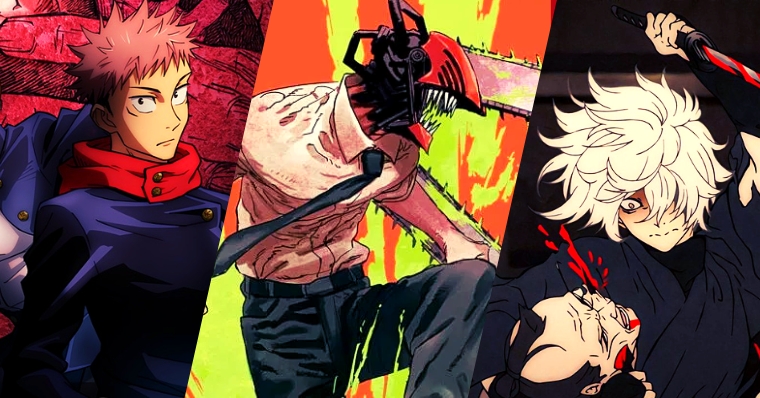Shonen anime is practically a household name when it comes to narratives pulsing with heroism, friendship, camaraderie, and the compelling development arcs of the main characters. Given these key elements, it's no wonder that shonen often gets pigeonholed as a genre catering to the younger crowd. You see, the "heavier" stuff usually gets stamped with the label of "Seinen," another genre more inclined toward mature themes. But here's a little secret—shonen is a genre that can also delve deep into the realms of darkness. Now, if your interest is piqued, we're about to explore the 8 darkest yet incredibly popular shonen animes out there. Ready to dive into this unique blend of stories? Let's get the ball rolling with the list, shall we?
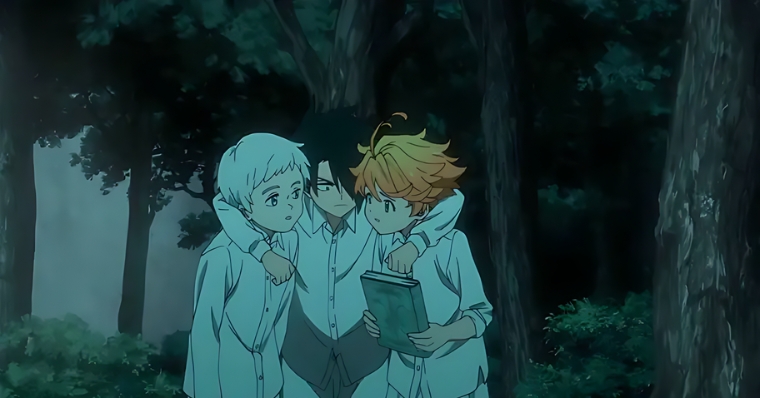
The Promised Neverland
The anime world is seldom a stranger to controversy, and "The Promised Neverland" is no exception, particularly when it comes to its polarizing second season. Yet, it's worth revisiting just how groundbreaking its first season truly was, particularly for fans of shonen with a darker edge. Initially, the show wraps you in a warm blanket of innocence and camaraderie, presenting an orphanage filled with happy, playful kids who coexist in a peaceful haven under the loving supervision of their caretakers. But hold onto your seats because the serenity is but an elaborate façade. The heart-stopping revelation is akin to discovering that your childhood sandbox was actually quicksand. This is no regular orphanage; it's a human farm designed to fatten up children as gourmet meals for demonic entities. These monsters don't want just any child; they want intellectual delicacies, kids raised in an environment that promotes intelligence—just to make their palate experience all the more exquisite. Our protagonists—Emma, Ray, and Norman—are the elder siblings in this twisted family dynamic. When they stumble upon the horrendous secret, their childlike innocence is shattered like glass hitting a concrete floor. They take it upon themselves to hatch a daring escape strategy. The mission becomes a high-stakes game of chess, the objective being to elude their monstrous predators while ensuring the safety of their younger, more vulnerable siblings. In a media landscape flooded with dark narratives and antiheroes, "The Promised Neverland" sets itself apart, not just by the intensity of its story but also by its willingness to wrestle with complex emotional and moral questions. Based on the award-winning manga by Kaiu Shirai and Posuka Demizu, which itself has garnered over 42 million copies in circulation by 2023, the anime made waves right from its debut season in 2019. And let's not forget its American live-action series in the works by Amazon Studios. This is not just another anime; it's a cultural milestone. The horror genre in anime often walks a fine line between gruesome violence and psychological dread. While Hollywood serves up meaty horror flicks like "The Conjuring" or "It," Japanese anime has often struggled to reach that echelon, notwithstanding the legacy of J-horror in movies and video games. But here's where "The Promised Neverland" throws a curveball. It forgoes gratuitous gore and instead stirs up unease through intricate storytelling and atmosphere so thick, you could slice it with a knife. A simple dialogue exchange could have your pulse racing and your fingers gripping your seat as the characters navigate a world that grows darker by the episode. Dive into the show, and you'll soon see it's not merely about adrenaline-pumping horror but also a reflection on the loss of innocence, on realizing that the world isn't as rose-tinted as youthful eyes may perceive. Even though the kids live in what seems like an earthly paradise—plenty of food, ample space to play, and a maternal figure who oversees their well-being—they're subjected to peculiar IQ tests and quickly notice that friends who "graduate" from the orphanage never seem to send any postcards. When the curtain lifts on their grim reality, it isn't just a twist; it's an existential shockwave. So, what sets this anime apart? Perhaps it's the way it masterfully marries the thrill of a suspense thriller with the unsettling aura of a horror tale. It keeps its cards close to its chest, revealing its secrets in a fashion that reminds one of the early episodes of mystery thrillers like "Lost." It plays around with viewer perspectives, often keeping you at arm's length, making you feel like you're watching these events unfold from some shadowy recess. Couple this with CGI environments juxtaposed against 2D characters, leaving you with a creeping sense that something is horribly amiss. It's one thing to realize that the doors these kids exit through don't lead to a new family, but it's an entirely different level of terror to see the pure fear etched on a child's face when confronted with the horror of mortality. "The Promised Neverland" is a chilling but compelling narrative that reels you in with its emotional gravitas and relentless tension. If you're seeking an anime that will not only shock your system but also tug at your heartstrings, this series deserves your undivided attention.
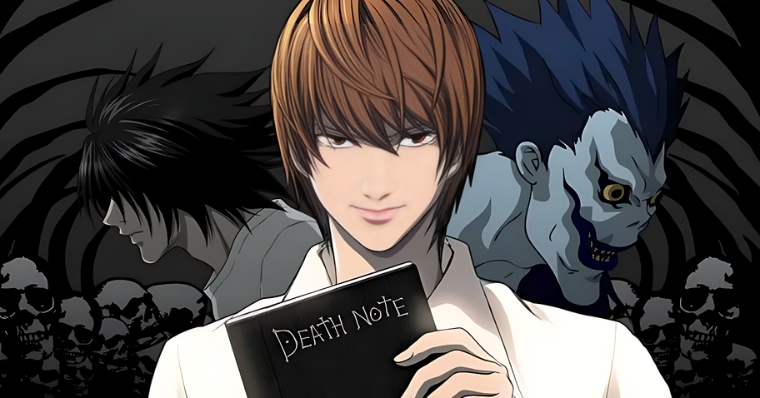
Death Note
Have you ever encountered a compellingly dark tale that leaves you questioning your moral compass? Enter "Death Note." It's an anime that sounds like it crawled straight out of a gloomy evening's urban legend. Set against a backdrop of untimely demises, puzzling riddles, intricate investigations, and heart-pounding suspense, it captures our innermost fears and fascinations. Our tale begins with a death god named Ryuk, who's succumbed to the universal emotion of boredom. Instead of finding a new hobby, he decides to drop his supernatural notebook, the Death Note, onto Earth. Enter our protagonist, or should we say, antagonist? Light Yagami, an overachieving student with a seemingly straight moral compass, finds it. But power can twist the best of us. With the Death Note in hand, he embarks on a journey, transforming from a diligent student to a serial killer with a god-complex, wanting to cleanse the world of what he sees as evil. But here's where "Death Note" stands out in the sea of anime. Its portrayal of death isn't just for shock value; it's a deep dive into what humans could become when handed god-like powers. And this grim theme is precisely what's made it one of the most gripping anime series for years. A high schooler, a supernatural notebook, and a profound moral dilemma - it's not your everyday teen drama. Light Yagami's discovery of the Death Note turns his world on its head. Write a name while envisioning the person's face, and poof, they're gone. So, with this newfound power, Light embarks on a mission to create a crime-free world, with himself reigning supreme. But it's never that easy, especially when genius minds challenge your every move. Authored by Tsugumi Ohba and illustrated by Takeshi Obata, "Death Note" originated as a manga series in 2003. Its captivating narrative and distinct artistic style soon catapulted it to global fame. Over the years, this tale has morphed into various adaptations – from movies to TV dramas, each offering a unique spin on this classic story. With great power comes great...controversy. "Death Note" is unapologetic in its narrative, which has occasionally put it under the scanner. Some countries found its themes a tad too unsettling. From its vivid portrayal of violence to its intricate dance with religious ideologies, "Death Note" certainly doesn't tread lightly. This audaciousness has often made it a target of bans in places like Russia and China. Yet, it's essential to remember that fiction, at its core, is an exploration of our shared human experience. And while "Death Note" dives deep into the murkier realms, it also shines a light on the complexities of our inner world. Now, what sets "Death Note" apart? It can take us down a winding rabbit hole of moral ambiguity. When you're thrown into a universe where a high school student plays god, you must question: What is justice? Light Yagami is the embodiment of this moral struggle. On the surface, he's the quintessential golden boy - brilliant and driven. But beneath this facade lies a complex web of intentions, ambitions, and flaws. This descent into moral greyness makes him oddly relatable. While his actions might seem extreme, his underlying emotions resonate with many of us. We have "L," Light's arch-nemesis, and the world's greatest detective on the other side of the spectrum. His quirks are both endearing and brilliant, making him a fan favorite. The intellectual tug-of-war between Light and L forms the crux of the series, and their dynamic is a true testament to the intricate character development that "Death Note" offers. It's not just the story and characters that steal the show; the music accentuates every twist and turn. Composers Yoshihisa Hirano and Hideki Taniuchi have crafted a hauntingly beautiful score, elevating the narrative to new heights. "Death Note" challenges, teases, and makes us reflect. Whether it's the supernatural elements or the intense psychological warfare, it never strays far from its core theme - the human psyche's fragility. Its daring narrative choices, coupled with impeccable character development, ensure its spot as a timeless classic in the annals of anime. Yet, like any great work, it's not without its potential flaws. The series' final arc is a departure from its established tone, speeding things up a notch. But whether you love this shift or are left yearning for the initial slow burn, one thing's sure - "Death Note" is a rollercoaster that you won't soon forget.
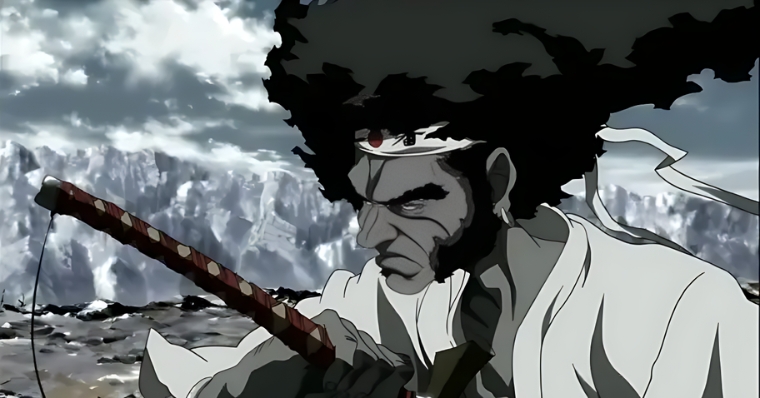
Afro Samurai
Afro Samurai isn't your run-of-the-mill anime — it's a five-episode whirlwind that dives headfirst into the life of Afro, a man hell-bent on avenging his father's death. When you live in a dystopian world where swordsmanship defines social status, you've got to be sharp in more ways than one. Afro faces a gauntlet of adversaries, each one deadlier than the last, all to confront the elusive Number One swordsman who holds the key to his vengeance. The narrative unfurls like an ornate tapestry, woven with threads of intense adult themes like solitude, remorse, betrayal, and, of course, revenge. Afro Samurai shatters expectations, offering a hero's journey that's more of a zigzag than a straight line. The experience is as refreshing as a blast of cold air in a stuffy room. Envision a dark yet dazzling Feudal Japan projected through a futuristic lens. Here, Afro's sword slices through not just samurais but also tech-augmented assassins and cultists brandishing RPGs. He confronts Afro Droid—a mechanical clone of himself—and revisits the ghosts of friendships he betrayed for his quest. And let's not forget all of this is set to a mind-blowing soundtrack by RZA that combines ancient strings with modern beats. It's like someone tossed hip-hop, samurais, and a post-apocalyptic fever dream into a blender and hit "puree." Voice acting? Top-notch. Samuel L. Jackson lends his iconic vocal chords to not just Afro but also to his quirky sidekick, Ninja Ninja. While at first, Ninja Ninja may seem like mere comedic relief, pay close attention. This character carries more layers than an onion, adding a level of psychological depth you wouldn't typically expect from this genre. That's the thing about Afro Samurai: just when you think you've got it figured out, it tosses you a curveball. Animation-wise, we're talking premium stuff. Studio Gonzo doesn't hold back on the visuals; every frame is a labor of love. Whether it's the ethereal beauty of a temple maiden (who won't remain so for long when Afro arrives) or the visceral, arterial spray of combat, the anime doesn't skimp on details. So you might be wondering, does the anime have any downsides? Well, it does send a mixed message about violence. In a series where blades and bloodlust are essentially characters unto themselves, the final moments sort of pull a 180, hinting that maybe, just maybe, violence isn't the answer. It's like mixing water with oil in an otherwise perfect recipe. This is no reason to shy away. Afro Samurai is an adrenaline-fueled roller coaster that doesn't require a seatbelt—just an appetite for action, aesthetics, and a dash of existential musing. And good news, a new season was on the horizon back in 2008, which means more Afro and more carnage. Count me in. If you're an action fan who appreciates complexity and nuance, Afro Samurai should be penciled into your must-watch list. It's not just an anime; it's an experience that flips the script, challenging your perceptions and expectations.
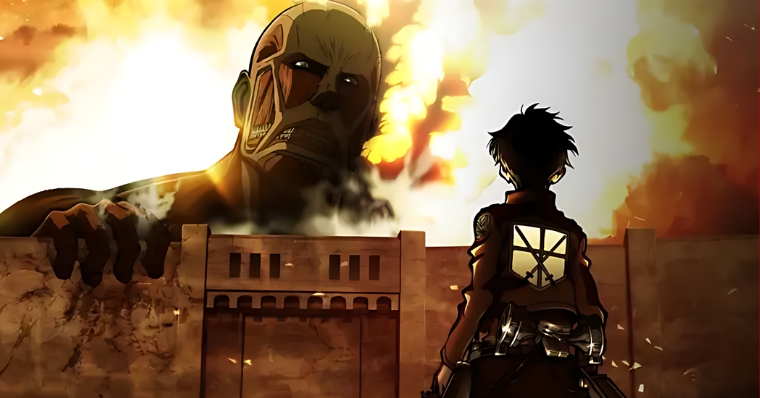
Attack on Titan
For those who prefer entertainment on the gentler side, consider this fair warning: "Attack on Titan" might not be the show for you. This anime unfurls a gripping tale of a society barricaded within colossal walls. These barriers, though seemingly impenetrable, hide a dark secret. Their primary function? To shield the citizens from Titans, monstrous giants with an unsettling penchant for human flesh. Now, let's get one thing clear. Throughout this anime, characters you might grow attached to face horrifying fates - being eaten alive, torn apart, and the like. As the plot advances, especially nearing its climax, the show's dark undertones become even more profound. Our hero, Eren Yeager, is prepared to wipe out the global populace through a cataclysmic event known as the Rumbling, where Titans wreak havoc without restraint. However, let's shed some light on the other side of the coin. "Attack on Titan," penned and illustrated by the talented Hajime Isayama, offers more than just gore. It's a profound exploration of humanity's will to survive in a world where existential threats loom large. The story trails Eren Yeager's journey from a vengeful youth, haunted by the Titans' destruction of his home and the brutal death of his mother, to a man with a mission. The history of "Attack on Titan" extends beyond the anime. Its origins lie in a popular manga series serialized in Kodansha's monthly magazine, running from 2009 to 2021. Following the manga's success, the story was adapted into an anime series, masterfully produced by Wit Studio and MAPPA. The anime has attracted a vast viewership in several seasons, eagerly awaiting each episode's release. While it's a given that the narrative is riveting, "Attack on Titan" stands out for its well-designed universe. The depiction of Titans, while spine-chilling, captures the essence of what makes them both intriguing and horrifying. These aren't your typical giants. Their eerily human-like faces, combined with their unnerving movement patterns, provide a visual experience that's both captivating and disturbing. One can't discuss "Attack on Titan" without acknowledging its impeccable production quality. Whether it's the adrenaline-pumping action sequences with the 3D maneuver gear or the detailed backdrops that breathe life into the setting, the anime is a visual treat. The score, too, is worth mentioning. The intense background music and iconic opening tracks amplify the viewing experience. Yet, no creation is without its flaws. Eren, the protagonist, is a divisive character. Some viewers find his impulsive nature and seething anger off-putting. In contrast, side characters like Armin and Mikasa are more universally appreciated for their depth and growth. And while the plot is largely gripping, certain elements raise eyebrows and unanswered questions. Some events conveniently line up, and backstories could benefit from further exploration. Despite its shortcomings, "Attack on Titan" remains a monumental work in the anime and manga world. At its core, it's a tale of resilience, sacrifice, and the indomitable human spirit. It reminds us that even in the bleakest situations, hope, however faint, persists. Whether you're diving into the anime for its action-packed sequences or its deeper philosophical musings on humanity's essence, "Attack on Titan" promises a rollercoaster of emotions. Just be prepared for some unexpected turns!
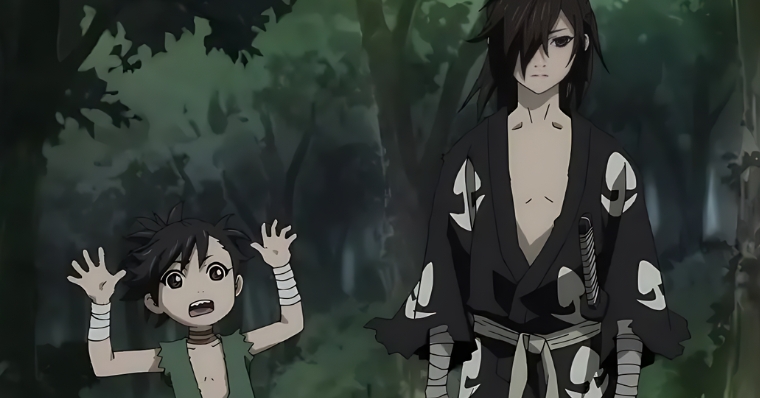
Dororo
Meet Hyakkimaru, a compelling protagonist you're unlikely to forget anytime soon. Born with a grim fate, this young man was cruelly disfigured—robbed of eyes, limbs, and even skin by insatiable demons just moments after his birth. Abandoned by his family, who considered him too frail to survive, you'd think life dealt him the cruelest hand. But against all odds, Hyakkimaru perseveres. Discovered by a compassionate carpenter, he grows into adulthood equipped with prosthetics, determined to regain what was unjustly taken from him. His mission is as straightforward as it is daunting: hunt down and defeat the very demons that stole pieces of him, thereby reclaiming those pieces one by one. Along this dark and often perilous journey, he encounters Dororo, a young orphan thief with a mischievous spark and a complicated past. Dororo's lightheartedness offers a counterbalance to Hyakkimaru's intense quest, yet their lives intertwine in ways that underscore the haunting depths of Hyakkimaru's existence. Truly, their collective story is one that sticks with you long after the credits roll. Created in 2019 as a reimagining of Osamu Tezuka's groundbreaking manga, the anime series "Dororo" takes some storytelling risks, to say the least. Tezuka, often hailed as the godfather of manga, would likely be proud to see how his 1960s original has been adapted for a new generation. Dororo, the show's namesake, is a young thief brought up as a boy, despite being born biologically female—a tidbit revealed late in the narrative that adds layers of complexity to this charismatic character. Far from your average sidekick, Dororo exhibits a unique blend of bravery, mischief, and deep-seated loyalty, as he follows Hyakkimaru on a journey neither could complete alone. MAPPA Studios is a virtuoso when it comes to reviving classics. From "Banana Fish" to "Ushio To Tora," the studio specializes in dusting off gems from the past and injecting them with new life. While "Dororo" joins these ranks as an anime well worth your attention, it does tread a slightly different emotional terrain. Unlike "Banana Fish," a show that can emotionally incapacitate you for, oh, let's say, 72 hours, "Dororo" presents an intriguing blend of dark fantasy that captivates but might leave you wanting just a smidge more. Yes, "Dororo" may not hit all the high notes that other MAPPA adaptations have. Even with a rock-solid foundation and a story steeped in generational sins and redemptive arcs, the anime falls slightly short on depth. It's not that it lacks an overarching narrative; it's just that the episodic 'monster-of-the-week' structure sometimes overshadows more profound character development. The pacing feels stretched at moments, causing your engagement level to waver. Yet, let's be crystal clear: "Dororo" is still a visual spectacle. The series is a feast for the senses, from its eye-popping fight scenes to the lush, ethereal landscapes that frame each episode. The animation quality alone will pull you into its dark, fantastical world. If you have a penchant for samurai dramas doused in otherworldly folklore, then "Dororo" is a fitting addition to your watchlist. While it might not exploit its full potential, it's nonetheless a memorable and visually compelling experience. It straddles the line between darkness and fun, gripping your attention and making you ponder its underlying themes. So, if you're up for a story about resilience, vengeance, and the complex nature of humanity, then give "Dororo" a shot. You won't regret it.
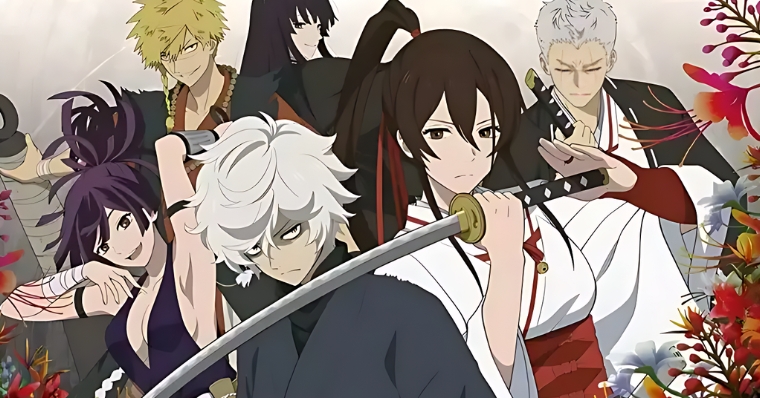
Hell's Paradise: Jigokuraku
Our list now features the much-hyped "Dark Trio of Shonen Jump," and taking the lead is none other than the 2023 sensation, "Hell's Paradise: Jigokuraku." Making waves right out of the gate, the show isn't for the faint-hearted, serving buckets of gore every episode. In this adrenaline-pumping world, we're introduced to Gabimaru, a ninja assassin whose reputation is as fearsome as his skills. Infamously known as "Gabimaru the Frost," he faces a death sentence but is seemingly impossible to kill. After several execution mishaps, he's offered a dangerous mission to retrieve the fabled "Elixir of Eternal Life." Gabimaru and his motley crew embark on an arduous journey to the enigmatic Paradise Island, where the elixir is believed to be hidden. Little do they know, the island is essentially a death trap teeming with grotesque creatures lying in wait. Sounds fun. MAPPA truly outdid themselves with "Hell's Paradise: Jigokuraku," adding yet another gem to their portfolio of highly-praised anime adaptations. The visuals are nothing short of stunning, with each frame painstakingly detailed and carefully animated. The first and last episodes are particularly jaw-dropping, especially when it comes to the final showdown with Mu Dan, the series's main antagonist. Unlike previous battles in the series, the fight sequences are fluid, high-octane, and bursting with dynamic energy. While the animation may have moments of inconsistency, this could be attributed to the sky-high standards MAPPA set for themselves with previous shows like "JUJUTSU KAISEN." Nevertheless, the quality remains high, with special attention given to capturing the vibrant hues and kaleidoscopic colors that bring Yūji Kaku's manga universe to life. True to the source material, the anime adaptation captivates the audience with its mesmerizing landscapes and intricate details. It's common for anime adaptations to add their personal touch to certain scenes, much like Pierrot did with "BLEACH: Thousand-Year Blood War." However, "Hell's Paradise: Jigokuraku" remains faithful to the manga while creatively highlighting the enchanting beauty and horrific elements of Kotaku Island. Even the role of flora serves a narrative purpose, adding layers of complexity to the plot. Despite being part of the darker, more mature realm of shōnen alongside titles like "JUJUTSU KAISEN" and "CHAINSAW MAN," "Hell's Paradise: Jigokuraku" brings its own unique flavor. There are slight modifications made for television adaptability, like downplaying explicit nudity, yet the essence and impact of the story remain untouched. The pacing may feel like a roller coaster ride given that the entire saga unfolds in a mere three days. This accelerated timeframe serves as a pressure cooker for character relationships, forcing them to form intense bonds quickly. By the fourth episode, we've already lost half of the Vanguard Party, which is a testament to the show's unforgiving nature. It keeps the viewer glued to the screen, eagerly anticipating the next twist and turn. Fans of older shōnen series might remember the days of endless filler episodes. Those days are long gone, and shorter series with tightly-knit story arcs are the norm. "Hell's Paradise: Jigokuraku" embraces this trend, allowing it to dive into crucial arcs and story developments right off the bat. This fast-paced storytelling is ideal for building anticipation for future seasons, especially given the post-credits revelations that drop just as you think you've caught your breath. In sum, "Hell's Paradise: Jigokuraku" has come out swinging in its debut season, dispelling initial skepticism about its potential to be a hit. The characters are layered and compelling, and the emotional moments in the show hit hard. The vibrant visuals authentically represent Yūji Kaku's manga, albeit with slightly less detail than some other high-profile MAPPA productions. But let's not let comparisons steal our joy; "Hell's Paradise: Jigokuraku" is a show that stands on its own merits. Here's to await what the next season has in store eagerly!
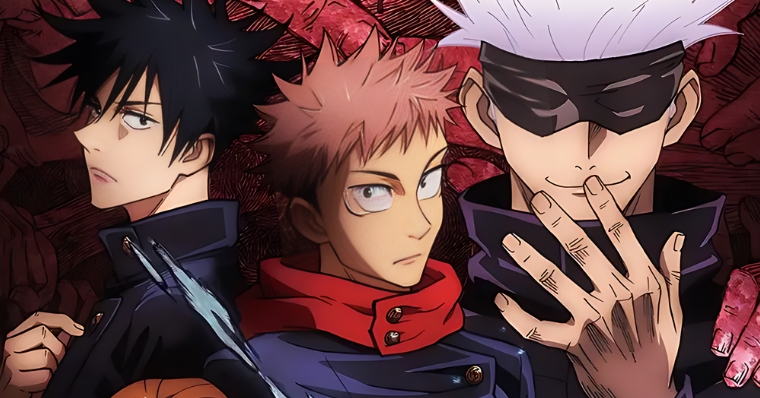
Jujutsu Kaisen
"Jujutsu Kaisen" stands tall in the vast arena of shonen anime and manga, making its mark as a part of the enigmatic "Dark Trio." It's not just about showing off intense, adrenaline-pumping battles—this series delves deep into its dark premise without flinching away from its violent and vivid scenes. The world it constructs is a shadowy maze, teeming with merciless curses with a certain, unsavory penchant for tormenting and ending human lives. Meet Yuji Itadori, our spirited hero, who finds himself in quite a precarious situation. In an unforeseen twist of events, he ends up swallowing a cursed object. Little did he know, this act made him the vessel for the fearsome Ryomen Sukuna, dubbed the "King of Curses." Yuji's new mission? Find and consume 19 more of these cursed objects. But here's the catch—it's all so he can be executed appropriately and, in doing so, defeat the demon within him. Delving a bit more into this sensation: The anime adaptation of "Jujutsu Kaisen" is brought to life by the talented Studio MAPPA, and it started captivating audiences from its premiere on October 2, 2020. This addition to the "Super Animeism" block on MBS, TBS, and affiliated channels is more than just a visual treat—it tells the gripping tale of humanity's struggle against curses born from their very own negative emotions. The very fabric of our day-to-day reality is interwoven with these curses, threatening misfortune and doom. Yuji Itadori might seem like your regular high schooler, boasting impressive physical prowess. Still, his life takes an extraordinary turn when he consumes the finger of Sukuna to save his friend from an evil curse. From then on, Yuji's life becomes inextricably linked with that of the Curse King. With the guidance of the powerful jujutsu sorcerer, Satoru Gojo, Yuji enrolls at the Tokyo Jujutsu High School of Sorcery. Thus, it unfolds an epic saga of a young lad who, despite becoming a curse himself, decides to battle them head-on, risking a point of no return. Why has "Jujutsu Kaisen" garnered such widespread acclaim, becoming a standout in the realm of anime? One can't help but be captivated by its charismatic lead, Yuji Itadori. With his vibrant pink hair, boundless strength, and tenacious spirit, Yuji faces life's harshest moments—from heartbreaking losses to confrontations with malevolent creatures—without losing his radiant smile. But Yuji isn't the only character who captures the audience's imagination. The story is enriched by the intricate dynamics between its cast, featuring layered personalities like those of Satoru Gojo and Megumi. Their depth and complexity serve as a magnet, drawing viewers in and making comparisons to legendary characters from other iconic anime series inevitable. And then there's the narrative's tone: dark but deeply layered. The series doesn't hold back from venturing into haunting terrains, filling its world with genuine horror and lurking dangers. This creates an atmosphere that is simultaneously unsettling and utterly gripping. Interestingly, "Jujutsu Kaisen" offers a fresh perspective on well-worn anime tropes. While the series embraces its darker elements, it also balances them with unexpected moments of levity, like an impromptu baseball game in the middle of an arc dedicated to intense battles. As for the power dynamics in the series, they're nothing short of revolutionary. The concept of 'Cursed Energy,' fueled by human negativity, adds shades of gray to the characters' abilities, challenging the traditional definitions of heroism. This is taken a step further by introducing Yuta Okkotsu, a character whose unique bond with a high-grade cursed spirit complicates the narrative's moral landscape even further. The show also deserves praise for its strong female representation. In a genre where male protagonists often eclipse their female counterparts, Nobara Kugisaki is a beacon of feminine strength, matching her male peers in every respect. But it's not just fans who have taken notice of the show's brilliance; critics have, too. "Jujutsu Kaisen" has won numerous accolades, including the Crunchyroll award for Best Action, besting heavyweight competitors like "Attack on Titan" and "Demon Slayer." One can't talk about the series without mentioning its well-crafted power system. The advent of Cursed Techniques adds an intricate layer to the battles, reminiscent of the detailed strategies found in series like "Hunter X Hunter." Another feather in its cap is the pitch-perfect pacing. The narrative flows effortlessly, introducing a multitude of characters, laying out the power systems, delving into tropes, and even taking time for seemingly trivial events without ever feeling disjointed or rushed. In a world where anime series often flicker briefly before fading away, "Jujutsu Kaisen" has not only captured the spotlight but has also held onto it firmly. It's a narrative that resonates, intrigues, and thoroughly enthralls its audience. And given its trajectory, the future looks exceedingly bright for this groundbreaking series.
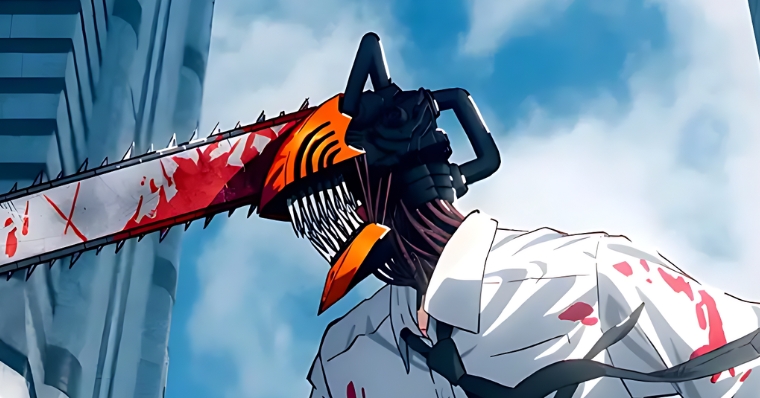
Chainsaw Man
Amidst this pantheon of phenomenal works, one anime stands out like a lighthouse in the darkest, stormiest night—Chainsaw Man, courtesy of the animating gurus at MAPPA. The story revolves around Denji, a youth struck with the essence of the Chainsaw Devil, allowing him to morph sections of his body into chainsaws. But it's not just a body modification; it's a one-way ticket into the Public Safety Devil Hunters, a governmental task force designed to hunt down those devilish fiends wreaking havoc. It turns out the world is far more nuanced and unsettling than Denji ever fathomed, and you won't believe the depths it'll plunge to. Anime often delights us with a kaleidoscope of characters, and Chainsaw Man is no exception. But what sets this series apart is the unnerving blend of badassery and raw human emotion that each character embodies. They're not just remarkable fighters but walking, talking conundrums of vulnerability and strength, making them compelling on multiple layers. For instance, Denji's life goals are rudimentary yet deeply resonant. He craves a basic, normal life: good food, stable shelter, and a romantic connection. But when he merges with Pochita, his Chainsaw Devil alter-ego, the screen bursts into a spectacle of astonishing, gruesome artistry. He may have straightforward aspirations, but the contradiction between his humility and his terrifying ferocity is precisely what makes him a character you can't help but love. The beauty of Chainsaw Man lies in its intricacies, especially when it comes to character motivation. Everyone has a reason to be part of the devil-hunting brigade, whether it's to gain proximity to Makima, a leader in the unit who rescues Denji, or to fulfill some hidden agenda. Thus, navigating the series becomes an exercise in skepticism. Just when you think you've figured out a character, the rug gets pulled out from under you, and your theories go up in smoke. It's a storytelling gambit that'll keep you at the edge of your seat, episode after episode. World-building can make or break a fantasy series, and let me tell you, Chainsaw Man excels at it. It's not just about how devils get vanquished or how they interact with the mortal realm; it's about the intricacies and mysteries of an ecosystem teeming with things both beautiful and dreadful. Whether it's the procedures of hunting down devils or the surreal training methods, the series unveils its secrets with poetic elegance, making the experience tantalizingly engrossing. What Chainsaw Man accomplishes is an artful form of narrative sabotage. Just when you've settled into a feeling of security or understanding, the series unfurls a scene that shakes you to your core. Whether it's a sudden plot twist or a horrendous occurrence, you'll find yourself gobsmacked, wondering why the world could be so cruel and yet so captivating. It's like an emotional rollercoaster, but one where you can't see the tracks. The animation in Chainsaw Man is top-tier, especially when it comes to its visceral, heart-stopping fight sequences. There's something oddly satisfying about watching the screen fill up with artful chaos as characters you've grown to love (or hate) engage in battle with an array of menacing, fearsome devils. These encounters are not for the faint-hearted; they are brutal and gut-wrenching, portraying monstrosities spawned from the very fears that haunt humanity. To sum it all up, if you're yearning for an anime that melds relatable characters with unpredictable twists and pulse-pounding action, Chainsaw Man should be your next binge-watch. This series is a masterful blend of emotional complexity, suspense, and raw power that will keep you enthralled till the very end. And trust me, you'll want to be there for whatever comes next.









